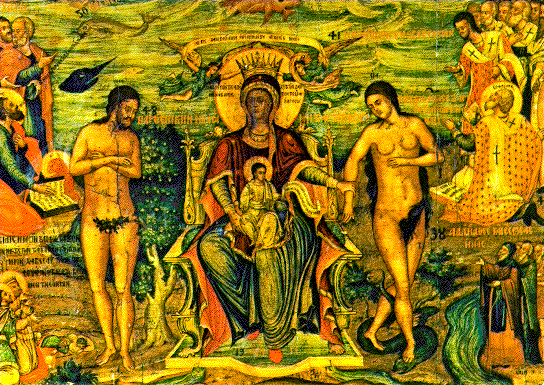
As we once again embark on our Lenten journey to the Lord's Cross and Resurrection, the Church once again returns us to our common origin. A sizable portion of the book of Genesis is read throughout the course of the Lenten services, as our goal, or telos, is inextricably bound up with our beginning, fashioned from dust and placed in Paradise to reign over all the earth.
To know where we are going, we must know from where we came, precisely because the life in Christ that we seek is itself a return to the paradisaical state from which we fell, as St. Gregory of Nyssa states: "Now the resurrection promises us nothing else than the restoration of the fallen to their ancient state; for the grace we look for is a certain return to the first life, bringing back again to Paradise him who was cast out from it. If then the life of those restored is closely related to that of the angels, it is clear that the life before the transgression was a kind of angelic life, and hence also our return to the ancient condition of our life is compared to the angels."[1]
If man’s original life, his original mode of nature was something angelic, then it remains for the theologians who converse with the angels, and themselves live the angelic life, moreover conversing with God Himself, to speak to us about the newly-created world, before the Fall, and thus the Orthodox Church continues to set forth, through her saints, the Patristic teaching on the creation of the world and man’s original life in Paradise—a life of incorruption and full of virtue.
Fr. George Maximov is a well-known missionary priest in Moscow, who travels throughout the world to spread the light of Orthodox Christianity. He was a close friend of the martyred Fr. Daniel Sysoev, who served as secretary for the Shestodnev ("Six Days") organization which propagates the Patristic teaching on Genesis, and he continues his missionary endeavors. Fr. George wrote the present article in defense of the Patristic teaching on Genesis, in response to remarks of Sergei Khudiev, a Russian Orthodox journalist and radio personality, in his answer to an agnostic biologist on various topics.
* * *
I would like to discuss the phenomenon of so-called “Orthodox” evolutionism—a teaching which tries to incorporate into Orthodoxy the Darwinian view of the origin of animal species and mankind.
When adherents of the present views debate about “scientificity,” they feel very confident, looking down from on high on those Orthodox who still maintain faith that the creation of the world, life, and mankind happened just as is written by God in His Word. The confidence of the followers of this new teaching contributes to the prevalence of evolution in the scientific community and in modern culture in general.
However, “Orthodox” evolutionists begin to feel very insecure and uncomfortable when the conversation turns to the Holy Fathers—inasmuch as in Orthodoxy the patristic heritage enjoys an exceedingly high authority, and the Holy Fathers, like it or not and no matter how disconcerting, are by no means on the side of the evolutionists. Therefore, “Orthodox evolutionists” often try to sidestep this uncomfortable situation, pretending that the problem simply doesn’t exist.
Unlike many others, Sergei Khudiev acknowledges that a radical discrepancy between the patristic and evolutionary understandings of the six days of creation exists. And he offers the following argument to eliminate the problem:
Personally I find it inconsistent to refer to the Holy Fathers, rejecting the theory of evolution, but for all that to accept the Holy Fathers, who, like all educated people of their time accepted Ptolemaic conceptions, and geocentrism. In fact, if we take the Holy Fathers as instructors in the natural sciences, then honesty and consistency demands us to accept the whole of patristic cosmology and biology—without exception. But if we accept that the Holy Spirit inspired the Fathers (as also the biblical authors) on the path of salvation, but not in the rotation of planets or the formation of species, then we won’t mistakes apples for oranges, and scientific theories for heresies.
By this argument, the author apparently hopes to neutralize generally all the Holy Fathers and their whole legacy which is uncomfortable for evolutionists. However, we can hardly say that he was successful.
The present argument assumes that the patristic teaching on the origin of the world and mankind is part of the antique views of the natural sciences, supposedly uncritically adopted by the Holy Fathers. God’s creation of the world out of nothing and the creation of man’s body from the earth, in the opinion of Sergei Khudiev, should be considered a single whole with Ptolemaic conceptions of the orbit of the sun around the earth and other outdated scientific views.
But where does the author get this from? The biblical and patristic teaching on the creation of the world was never “theirs” of the antique traditions, much less a “single whole” with them—neither Ptolemy, nor any of the ancient natural philosophers ever taught of the creation of the world in six days. The Holy Fathers didn’t borrow their teaching of creation from the pre-Christian past, but rather they took it entirely from Divine revelation.
If we open the Hexaemeron of St. Basil the Great or the Hexaemeron of St. Ambrose of Milan, we will see there apologetic passages, aimed at defending the biblical teaching against the criticisms of “outsiders.” Why did it need to be defended? Because for the secular intellectuals of the time, the teaching of the creation of the world by God in six days was a great scandal, just as for modern evolutionists.
In the ancient tradition there were several views on the origin of the world (including a view according to which the world is in general “uncreated,” eternally existing). In their specifics, these views, from the point of view of modern science, appear naïve, but according to the original premise they are much closer to evolutionism than to creationism, because these ancient hypotheses tried to comprehend the origin of the world as a natural process, not positing any kind of supernatural intervention from God.
For the Holy Fathers the doctrine of the creation of the world was never a part of cosmology, but a part of theology. As a piece of cosmology, these questions can be considered only if we are speaking of a natural process—that is, about how the world came about on its own. But the Holy Fathers didn’t consider the world to have emerged on its own. For them the origin of the world, life, and mankind was the result of a miracle, a supernatural event, a creative act of God, which “He spake, and it was done; He commanded, and it stood fast.”
Sergei Khudiev errs when he supposes that the Holy Fathers, like modern “Orthodox” evolutionists, obediently followed the naturalist views of their times. It seems to him that the Fathers “like all educated people of their time accepted Ptolemaic conceptions.” But if we look at the Hexaemeron of the holy hierarch Basil the Great, we see otherwise.
In a few places the hierarch actually provides a short overview of the then-existing naturalist views, but ends with the words: it’s for the scientists to refute one another, but we will turn to that which God says to us in Scripture.
Thus, the Holy Fathers were aware of the hypotheses of their time and were not afraid to acquaint their readers with them, but didn’t confuse them with Divinely-revealed truths. Sometimes for illustrative purposes they were able to use this or that naturalist view of their time—including erroneous ones—but they never placed them at the foundation of their theological assertions, and never insisted that they were absolutely true.
The Fathers took great care in relation to science. This is well demonstrated by St. Gregory Palamas who says that:
In the case of outside wisdom it is necessary from the beginning to kill the serpent, that is, to destroy the arrogance that comes from it; then it is necessary to amputate and cast aside as undisputed and utmost evil the head and tail of the serpent, that is, patently fallacious ideas about things intelligible, divine, and primordial, and fables about creation; and the middle section, that is reasonings about nature, you should with the help of the intellective and contemplative faculties of the soul isolate harmful intellectualizations, as pharmacists cleanse the flesh of serpents by fire and water, extracting it … From serpents we also receive benefit, but it’s necessary only to kill, dissect, and make a drug out of them, and then to apply it with wisdom against their own bites.[2]
Mr. Khudiev should try very hard to find confirmation of his thesis about the geocentrism of the Holy Fathers, but it is unlikely that he will find anything more than the hitherto employed phrases “the sun rises” and “sets.” And it’s not because the Holy Fathers were heliocentrists, but because for them the question was wholly unimportant and uninteresting. But the question of the creation of the world was for them a foundational one, because it is directly connected to the doctrine of God.
Following the Bible they looked upon the creation of the world as a miracle of God, as a supernatural act. And miracles are by no means within the realm of the natural sciences, but rather the realm of theology. This is an area which any Holy Father understands better and in which he knows more than every biologist taken together, both past, present and future.
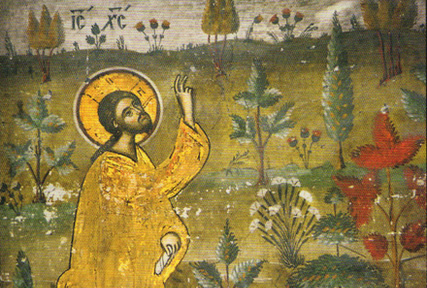
Sergei Khudiev considers that for the Orthodox consciousness the question of which cosmic bodies revolve around which and the question of how the world arose are phenomena of the same order. But in Scripture not a word is said of whether the earth circles around the sun or the sun around the earth, but here the description of the creation of the world and man is allotted not even simply a significant place, but one of great honor—with it begins the Book of Books. Not a word is spoken in the Creed about geocentrism, but that God is “Maker of heaven and earth and of all things visible and invisible” Sergei Lvovich repeats at every Liturgy together with all the faithful.
The creation of the world is a question not of abstract cosmology but of dogmatics. It touches upon teachings about God Himself and His relationship to us and ours to Him (as Creator and creation). Just as God does not simply call Himself Judge in His Word, but He explains precisely how He will judge people, likewise He does not simply call Himself Creator, but describes precisely how He created us and our world. And for the doctrine of every Holy Father living before Darwin, as for those living after the publication of The Origin of Species, there was an inherent simple childlike trust in God and His description of creation coupled with an unshakable conviction that the Creator Himself knows about how He created the world, much more than all the wise and learned men put together.
Having such a trust, the Holy Fathers weren’t afraid to appear foolish in the eyes of the secular intellectuals of their time and weren’t ashamed to insist upon the literal understanding of the six days of creation.
Venerable Ephraim the Syrian writes:
No one should think that the six-day creation is an allegory; likewise it is impermissible to speak as if … names herewith presented in the account signify either nothing, or signify something else.[3]
And St. Basil the Great says:
I know the rules of allegory … There are those who, accepting what is written not in its plain sense, say that that which is called water is not water, but some other substance, and to plants and fish they give a meaning of their own discretion. But hearing of grass, I understand grass; and plants, fish, beasts and livestock—everything—as it is called so I receive, not being ashamed of the Gospel (Rom. 1:16) … It seems to me it is this which has not been comprehended by those who, according to their own understanding, have set out to give some soaring and panoramic importance to the Scripture. But it means to set up oneself as wiser than the sayings of the Spirit and under the guise of interpretation to introduce one’s own thoughts. Therefore we will understand it as is written.[4]
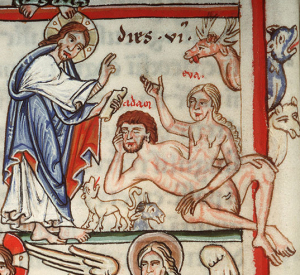
No matter how much I read the wittings of “Orthodox” evolutionists, clear answers to these questions are not found. For all their arguments, only one thing shines through: “shame before the world”—before the very world with which friendship is enmity with God (Jas. 4:4).
“Orthodox” evolutionists believe that we should bow our heads before secular science because, allegedly, it studies the world created by God and from there, supposedly, draws its knowledge and ideas. Indeed, the world, as the creation of God, is often called in the Christian tradition the book of “natural revelation,” because the reverent study of it ably leads man to a conclusion about the existence of the Creator. But science is not identical to the world.
Even if this or that scientist is convinced of the validity and even the proof of his hypotheses and theories, these hypotheses and theories remain nothing but his interpretation of the world. This interpretation can find very convincing evidence, when it comes to those phenomena which we can observe and study now, and those processes which are accessible for observation and reproduction.
But when scientists leave the sphere of experimentation and cross over into the realm of history, into the realm of speculations about unique past events, which are impossible to repeat—those such as the origin of the world and man—scientific comprehension is involuntarily limited to but indirect evidence. And if, given all this, we see that based on circumstantial evidence the interpretation of the world, offered by the fallen human intellect, comes into conflict with the testimony of the very Creator of the world, then for believers it becomes the basis upon which to subject to questioning the former, and not the latter.
St. John of Kronstadt spoke about this, and precisely within the framework of the theory of evolution and the resulting geological models of an “old earth,” as contradicting the narration of the six days of creation:
The Holy Scriptures speak more truly and more clearly of the world than the world itself or the arrangement of the earthly strata; the scriptures of nature within it, being dead and voiceless, cannot express anything definite. "Where wast thou when I laid the foundations of the earth?" Were you with God when He created the universe? "Who hath directed the Spirit of the Lord, or being His counseller, hath taught Him? (Is. 40:13)" And yet you geologists boast that you have understood the mind of the Lord, in the arrangement of strata, and maintained it in spite of Holy Writ! You believe more in the dead letters of the earthly strata, in the soulless earth, than in the Divinely-inspired words of the great prophet Moses, who saw God.[5]
Here we come to the dead end, to which “Orthodox” evolutionism leads its followers. Surprisingly, I have been writing about this for more than ten years already, but the adherents of this dismantled teaching continue to pretend they don’t notice. Well, let’s talk about it again, in more detail.
According to the Church’s faith, the origin of the world is a supernatural act, a miracle. The Bible describes it thusly, and the Holy Fathers understood it thusly. Science has as its goal, contrarily, the creation of a naturalistic view of the emergence of the world. It is a fundamentally insurmountable contradiction. The theory of evolution arose and received such wide and active support in scientific circles namely as an alternative to the supernatural picture of the creation of the world.
Therefore any attempt to “reconcile these two viewpoints” is doomed to failure. Because if you seriously try to bring into the evolutionary view any miraculous elements, of direct Divine intervention, it will be explicitly and categorically rejected by science, standing on secular positions.
And if you try—as do “Orthodox” evolutionists—to introduce into Orthodoxy a radical reinterpretation of the six days of creation, which presents it not as a supernatural act, the miracle of the creation of the world by God, but as a natural process, in which God is allotted the passive role of observation, and in the best case scenario, of the initiator of the first stage of the process—it will be rejected by believers who know that the whole two thousand-year Tradition of the Church teaches otherwise.
Secular science, we repeat, has as its task to describe the emergence of the world as a natural process, originating without any supernatural intervention. Within the framework of such a task the theory of evolution truly is the best that you can come up with. No one is arguing that. But in the Bible God describes the creation of the world as a miracle, as a series of supernatural acts perfected by the Trinity. Inasmuch as secular science a priori doesn’t work with the supernatural, accordingly the questions of the origin of the world, life, and mankind find themselves outside of the sphere of scientific competency.
If it nonetheless infringes upon these questions, remaining all the while in a secular posture, it inevitably errs, creating a false explanation there, where the true explanation finds itself outside the scope of its competency.
Likewise an historian, when he writes about the birth of Christianity, is faced with that the earliest sources testify that Christ is risen. But the scientist, remaining in a secular position, knows that natural processes don’t allow for a resurrection from the dead. Therefore, considering this question, he comes to the conclusion that more deserving of attention is the hypothesis that “the disciples stole the body,” or the hypothesis that Christ in reality did not die on the Cross, but simply lost consciousness, and then came to, or something similar, in agreement with the “scientific worldview.” If a scientist plainly states that Christ truly resurrected from the dead and ascended into heaven, then his article wouldn’t be carried in a single serious scientific journal.
But here there is no room for compromise. Either He miraculously arose, or He remained dead and underwent the same natural processes as undergoes every body of the dead. It is the same with the origin of the world—either a supernatural miracle of creation, or a natural process of evolution. It is as much a fundamental contradiction as is generally possible.
I will venture to illustrate this with a small story from my life. Once the Lord worked on me an obvious miracle. It was in December 2010. I was seriously ill, but when I communed of the holy Mysteries of Christ, the sickness passed. It happened instantly. Not only the symptoms disappeared, but also my weakness. I had just been seriously ill, but now suddenly I became completely healthy and full of strength. And moreover, it was a complete surprise for me—I had already resigned myself to the fact that I was going to be sick, and I wasn’t looking for a miracle.
If you were to show me to a doctor in the midst of the sickness, and then to inform him that I had recovered, then he would at least be able to estimate how much time should have been necessary for my recovery according to the natural course of things, depending on the chosen type of treatment. He is unlikely to take the story of my immediate recovery after Communion seriously, as it is “unscientific.”
But it is a fact, it is part of my experience. And if I, for the sake of not contradicting the “scientific view of the world” in order to not appear foolish in the eyes of the “modern and enlightened,” start saying that I recovered in two weeks and finally, thanks to pills, stood on my feet, then I will be a liar. I would betray God. Yes, God is able to heal me with pills within two weeks, but what happened, happened. It was a miracle. It is my duty to tell everyone what happened, and not what is more comfortable for secular people, constructing their worldview on materialistic principles, to hear.
Indeed, God can do anything, and He could have created the word through evolution. But He created it otherwise, and He spoke in His word about how He created and He interpreted through His friends and beloved children—the Holy Fathers. And if we reject this testimony and begin to substitute the speculations of men, which agree with the spirit of this age, then we lie. And a lie about God and His acts is very serious. Actually, every heresy is in essence a lie about God Himself or His acts.
“Orthodox” evolutionists really don’t like the word “heresy.” Here Sergei Lvovich objects: Please, do not confuse scientific theories with heresies.
But no one is confusing them. By itself the theory of evolution is not a heresy—it’s just generally accepted in the modern secular science framework for interpreting particular facts and phenomena. We can say it’s an erroneous interpretation, but we don’t call it a heresy. Heresy is a word from the theological lexicon.
But the so-called “Orthodox evolutionists” completely fall under this definition. And it is because, dear “Orthodox” evolutionists, that when you begin to discourse on the theme “God created with the help of evolution,” you leave the field of naturalism, leave the field of science and encroach upon theology. And here you are held responsible for what you say in a different way.
“Orthodox” evolutionists have taken on a strange view of theology from somewhere. The natural sciences, in their view, are serious, everything must be strict and exact, there is no room even for a shadow of a doubt but only to proceed strictly in the wake of modern scientific views. But Orthodox theology, in their view, is an open field for self-expression, where anyone can say everything that catches his fancy, and rightly reinterpret Christian teaching as he pleases. But this is a fallacious opinion.
If in science we deal with the fruits of fallen human reason, trying to comprehend the world around us and in this endeavor incessantly doubting, disputing, and denying the old in order to establish the new, then in Orthodox theology we have the truth, opened by God Himself, and our task is to grasp it precisely and so precisely pass it on to others. It is the most precise of sciences, and the fullness of knowledge.
Scientific knowledge is obviously incomplete, and therefore science must constantly “move forward” and undertake a colossal endeavor to at least partially compensate for its imperfection. This is why in science “new” is a positive term. But Orthodox theology already possesses the fullness of knowledge, the fullness of truth and takes care to preserve that which it has received.
The means of expressing the faith may change, but not the content of the faith, new clarifications of dogmatic formulas arise, but not dogmas themselves. This is why in Orthodox theology “new” is a negative term, such that St. Vincent even said that the saints:
left for their heirs a worthy example of how, from thenceforth, to crush with the authority of sacred antiquity the audacity of the obscene novelty of every delusion … in the Church there persists the tradition that the more God-loving someone is, the more likely he is to speak out against new concoctions.[6]
And this is so because if imperfection needs something new that is capable of improving it, then perfection—as is our faith—needs no innovation, additions, or changes, because changes introduced into perfection, serve only to corrupt perfection, transforming it into imperfection, as happens with every heresy.
Therefore the Fathers of the Seventh Ecumenical Council say:
We follow the ancient enactments of the Catholic Church. We maintain the definitions of the Fathers. Those who add anything to the teaching of the Catholic Church and those who remove anything from it, we commit to anathema.
Like it or not, “Orthodox” evolutionism qualifies as neither an “ancient enactment” of the Church, nor a “definition of the Fathers.” I think that to claim that the fantasy of a free-thinking Englishman of the nineteenth century on the origin of man from apes is “the faith of the Apostles, the faith of the Fathers, the faith of the Orthodox, the faith which has established the whole world,” even the most ardent supporters of “Orthodox evolutionism” dare not do.
All that remains for them is to either suppress the problem, or teach the Protestant-ism that the Holy Scriptures are unimportant for us and the Holy Fathers are hopelessly obsolete compared to us—“so smart and progressive”—or to maintain that the traditional Church teaching about the creation of the world and man and about the coming of death into the created world is an inconsequential trifle which has nothing to do with dogmatics and which therefore we can neglect for the sake of such a “great purpose” as friendship with the world.
But none of these options will find a basis in Divine revelation, expressed in Scripture or Orthodox Church Tradition.
I would like to end with the words of St. Justin (Popovich):
This theology, which bases its anthropology on the “scientific” theory of evolution, is nothing but “contradictio in adjecto” (a contradiction of definition). In truth, it is a theology without God and anthropology without man.[7]
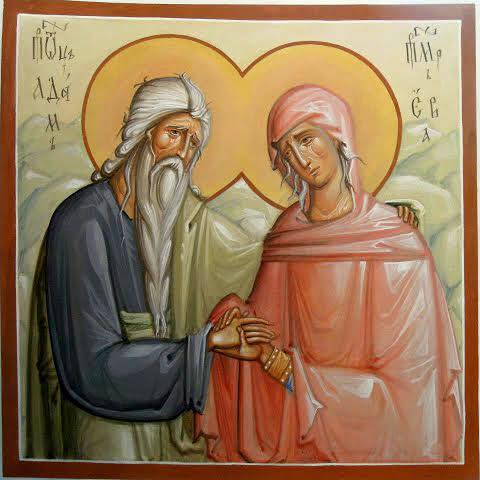 Our holy forefathers, Sts. Adam and Eve
Our holy forefathers, Sts. Adam and Eve
Originally appeared in Russian at Pravmir.

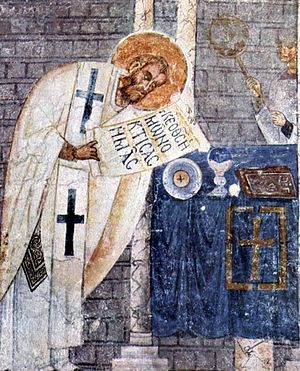
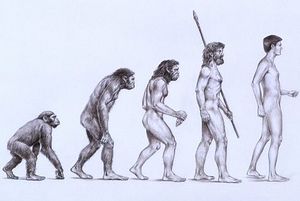
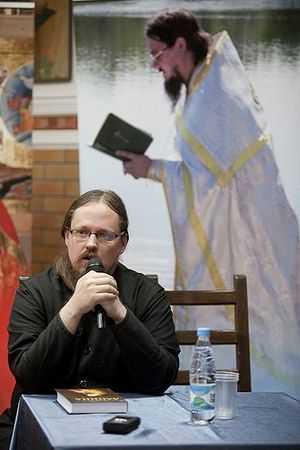
I majored in Anthropology because of my interest in the amazing variety of God's people, which required studying evolution. I by know means let ANYTHING I studied take precedence over my faith or conform my beliefs to the teachings of the world. I have my priorities straight and strive to do my best to use all knowledge to get to know God better. When I study evolutionary theories, I see God's miracle of creation, and consider the ways in which He works. I acknowledge that I don't know *how* God really does anything, and I recognize that pure scientific theory alone lacks the critical element of God. I think it's offensive to throw quotes around "Orthodox" on an Orthodox Christian who has considered the possibility of evolution. I would rather see quotes around Orthodox "evolutionist"--as the science is not pure, naturalistic science according to the materialist world when you insert God into the equation--than to say "Orthodox" evolutionist--as if any scientific consideration by the Christian disqualifies him or her from being Orthodox. Sure, I'm not a pure evolutionist so I hope you wouldn't put MY faith in quotes. I'd hate to know what else would cause people to put my faith in quotes if you knew all of my sins and shortcomings. Lord have mercy on us all.
--Dr. Antony Flew, 2004 (speaking about DNA complexity and his new-found belief in God. Dr. Flew was the author of “Theology and Falsification”, and was a foremost atheistic scientific writer/thinker of 20th Century)
"It's down not up." The DNA is devolving, NOT evolving.
yt: Prof. John Sanford on Genomic Entropy
http://youtu.be/_edD5HOx6Q0
Geneticists:
Dr. Crow: we are inferior to caveman.
Dr. Knodrashov: no human geneticist doubts man is degenerating.
Dr. Lynch Even assuming a lower mutation rate, we are degenerating at 1%-5% per generation.
Implies a young Creation and as with DNA complexity, theory of evolution is unlikely.
Dr. Francis Collins, head of Human Genome Project, converted to Christ partly due to the data he found working in genetics.
BTW-I like Ron Wyatt--he seems sincere and some of his findings are a matter of public record--the rest, who can know? He seemed led by God.
However, I would advise caution with Ron Wyatt, since he has claimed to have found pretty much everything in the Bible, including the Ark of the Covenant - allegedly found under the 'real' Golgotha, with Christ's blood on it...
I have in my personal possession 'brimstone' balls encased in ash that came from the Sodom Site, which is visible from Masada as one looks East. Josephus reported that the site was still visible at his time, and Scriptures report that it was given as an example. A Christian archaeologist Ron Wyatt discovered the site with ashen walls, ziggarauts, sphinxes all interpenetrated with millions of almost pure sulfur balls encased in formerly molten ash. The sites look from the distance as just another geographical arrangement, but closer inspection reveals otherwise.
https://houseofmaedhros.wordpress.com/2015/03/23/the-nature-of-man/
"Amidst the creation/evolution debate that is now raging, with evidence being offered for both sides, few have made use of what Fr. Seraphim Rose called the missing evidence : the timeless teaching of the Orthodox Holy Fathers on the events of creation, the first-created world, the natures of created things, the original nature of man, and the cosmic consequences of man's fall.
In the present volume, this teaching has been gathered and set forth in a thorough, detailed, and above all honest manner. Perhaps more than anyone else in our times, Fr. Seraphim Rose searched, studied, prayed, and struggled to understand how the Holy Fathers noetically apprehended the beginning of the world as revealed in the Divinely inspired book of Genesis. Having acquired their mind, he has presented to the modern world the harmonious Patristic vision of the cosmos."
If you are a Christian and do not believe that the Flood took away every living creature upon the Earth but those in the ark at the times of Noah or that the Sodomites were exterminated by fire and brimstone from Heaven, you are calling the Lord a liar (Luke 17, 26-29); you commune unworthily to His Body and Blood!
A few examples, but I hope clear enough.
If the Holy Scriptures talk of a precise genealogy since Adam and tell us the life duration of our forefather and his descendants, and all the Holy Fathers of the Church have always affirmed a literal reading of those passages, well, that means that a Christian knows the age of this world to be approximately seven millennia. He will not be intimidated by the raving laments of all the pathetic nonentities who think to exist only if they parrot the official narrative of their masters, he will just commiserate this sublime condensate of Stockholm syndrome and will plainly refuse to take seriously the Pavlov puppies.
But a few words must be said to those who claim to be Christians, as many of them are sincere in their love for the Lord but are led astray by the capillary indoctrination they are subjected to, since the birth, and by lukewarm shepherds and false teachers: you cannot believe a little in Christ and a little in the antichrists! You cannot believe a little in the Word of God and a little in the words of His enemies (and all they have are just words, not a single evidence or fact to support their fabulous claims!).
What does it mean in practice I will make clear in a few examples.
If the Holy Scriptures affirm that God created everything in six days and all the Holy Fathers of the Church (and I mean ALL!) have affirmed a literal meaning of those passages(this does not exclude other meanings, in the Holy Scriptures always coexist diverse layers of meanings and understandings, embedded in every passage, which does not exclude but complete reciprocally), well, that’s exactly what has happened, in that exact order!
Regarding heliocentrism, it's very possible that the affirmation that the earth revolves around the sun is the biggest lie ever proffered since a man in Rome claimed to be the vicar of Christ.
https://houseofmaedhros.wordpress.com/2015/12/14/e-pur-non-si-muove/
I think it’s high time to put definitely to rest all the “signs and wonders” of the forerunners and apostles of the Antichrist, which for the most part are fairy tales and stories for boys, taken seriously only by retarded adults or professional scammers, while the rest are mere technological advancements hindered and mutilated (remember Nikola Tesla) by the greed of the servants of Mammon.
All they have is a GROSS, CRASS LIE and the most formidable propaganda machine ever devised, with which they have been able to deceive, if possible, even the elects.